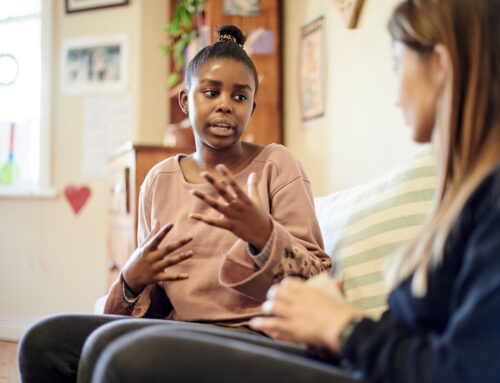Who Influences Teens More: Parents or Friends?

Every teen faces choices about alcohol. Parents may wonder, when their child reaches that crossroads: Will they listen to me, or their friends?
When it comes to underage drinking, many North Carolina parents believe their child’s friends have the strongest influence.
According to the 2023 NC Parent & Student Survey, 72% of parents said they think peers are the biggest factor in whether a teen drinks, while only 21% believed they themselves have the greatest impact (Talk It Out NC, 2023).
The truth, however, is encouraging. Research shows that when parents talk early and often about alcohol, their voice carries further than their child’s peers.
Teens Say Parents Matter Most
Data from Talk It Out NC shows that 93% of North Carolina teens believe conversations with their parents help prevent underage drinking. While 80% reported that conversations with friends help too, the results clearly indicate that parents remain the most powerful influence.
Parental dialogue is even more powerful when it comes from a place of listening and understanding that’s free from kneejerk judgment.
“For people my age, it can be very difficult to have conversations about underage drinking without feeling like you’re going to get in trouble,” says Sacha, a Raleigh student who struggled with alcohol use and recently celebrated one year of sobriety. “Having someone you can turn to makes all the difference.”
Why Conversations and Role Modeling Work
Talking with young people about alcohol isn’t just about setting rules: it’s about shaping values and building trust. Studies show that consistent, honest dialogue helps teens develop the confidence to say no when peers offer alcohol.
“Parents may think their kids are tuning them out, but the reality is that they’re listening,” says Stacy Grier, director for Education and Community Outreach at the NC ABC Commission. “We always say, ‘Talk early and talk often about underage drinking,’ because it can become an issue earlier than many parents may think.”
Role modeling is just as important. When parents demonstrate positive behavior — consuming alcohol responsibly, prioritizing healthy habits, and living out the values they encourage — they provide teens with a clear example to follow.
“Curiosity is what drew me in initially, and I think when you’re underage you’re more susceptible to that kind of pressure,” said Bodie, another North Carolina student, in a recent interview. “Encouraging open conversations and support from friends and family can help prevent young people from ever going down that road.”
At the same time, research cautions against giving teens alcohol—even “just a sip.” A 2025 study in Addictive Behaviors found that teens who drank with parental permission were more likely to drink heavily and experience alcohol-related harms in young adulthood.
“There are plenty of families that let their kid have a taste of their drink and that child does not have problems in the moment or down the line. But on balance, what the data tells us is that this is not necessarily the right choice,” Dr. Lisa Damour, clinical psychologist, told CBS News in March 2025.” “What it can do is normalize the idea of underage drinking, which is not something we want to do.”
The safest, most effective approach is providing clear guidance without providing alcohol.
Practical Ways for Parents to Stay Engaged
Parents can take concrete steps to keep the lines of communication open and reinforce healthy choices:
- Start Early and Keep Talking: Begin age-appropriate conversations in late elementary school and continue through high school.
- Set Expectations Clearly: Reinforce the fact that underage drinking is risky for maintaining good grades, keeping their spot on a sports team or arts club, and for driving safety.
- Use Real Scenarios: Discuss how to handle peer pressure or situations where alcohol is offered.
- Model Healthy Behavior: Demonstrate by example how to manage stress, celebrate, and relax without relying on alcohol.
- Leverage Tools: Talk It Out NC’s conversation cards and other resources can make discussions easier and more engaging.
When In Doubt: Talk It Out
While it may seem like friends are the dominant force in teens’ decision making, the evidence tells a different story: parents remain the single most influential factor in preventing underage drinking. By talking early and often, setting clear expectations, and modeling responsible behavior, parents can equip their teens to make safer, healthier choices.



